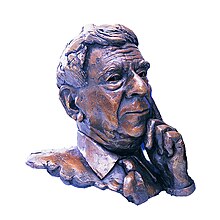
Back روي يورك كالن Arabic روى يورك كالن ARZ Roy Yorke Calne German Roy Calne French റോയ് യോർക്ക് കാൽനെ Malayalam
Sir Roy Calne | |
|---|---|
 A bronze bust of Calne by sculptor Laurence Broderick, outside the main operating theatres at Addenbrooke's Hospital | |
| Born | 30 December 1930 Richmond, Surrey, England |
| Died | 6 January 2024 (aged 93) Cambridge, England |
| Education | Lancing College King's College London Guy's Hospital Medical School |
| Spouse |
Patricia Whelan (m. 1956) |
| Children | 6 |
| Medical career | |
| Profession | Surgeon |
| Sub-specialties | Organ transplantation |
| Awards | Lister Medal (1984) Cameron Prize for Therapeutics of the University of Edinburgh (1990) Ernst Jung Prize (1992) Prince Mahidol Award (2002) Pride of Britain Lifetime Achievement Award (2014) |
Sir Roy Yorke Calne FRS FRCS (30 December 1930 – 6 January 2024) was a British surgeon and pioneer in organ transplantation. He was part of the team that performed the first liver transplantation operation in Europe in 1968, the world's first liver, heart and lung transplantation in 1987, the first intestinal transplant in the UK in 1992 and the first successful combined stomach, intestine, pancreas, liver and kidney cluster transplantation in 1994.
In 1960, Calne showed that 6-mercaptopurine (6-MP) could prolong the survival of a transplanted kidney in a dog, and later showed that azathioprine was more effective. Through the mid-1960s, he worked to develop solutions in surgical techniques and organ rejection. In the late 1970s, he began to experiment with the immunosuppressant ciclosporin A, which was then introduced into regular use to prevent organ rejection.
Calne was elected to the Royal Society in 1974, and was awarded the 1988 Cameron Prize for Therapeutics of the University of Edinburgh. He was awarded the 1984 Lister Medal, and knighted two years later. In 1990, he received the Ellison-Cliffe Medal from the Royal Society of Medicine. In 2012, he shared a Lasker-DeBakey Clinical Medical Research Award with Thomas Starzl.
© MMXXIII Rich X Search. We shall prevail. All rights reserved. Rich X Search